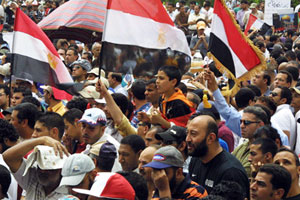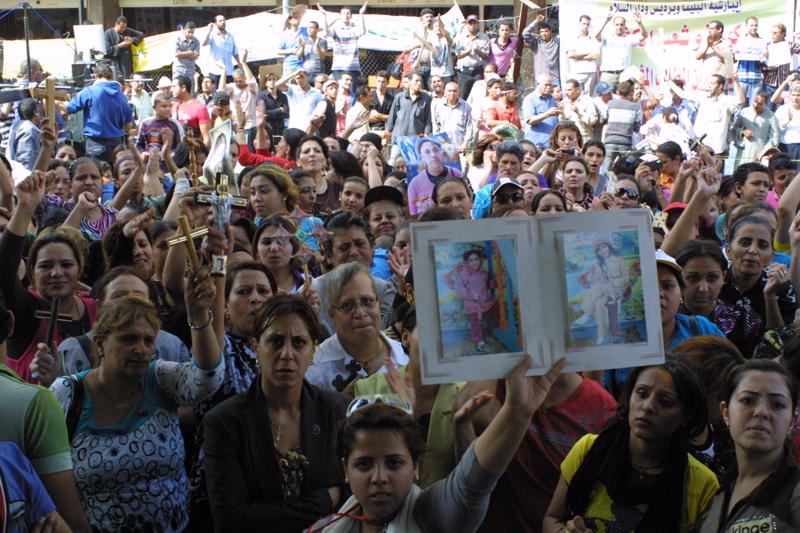
As Dr. Mohammad Shafik stands in the chaotic emergency room of the Cairo hospital where he works, his biggest worry as patients are wheeled in is not about issues of medical care. What concerns him is the lack of police protection against the fights and even murders that occur all too often in the city's hospitals. A dispute between two people might result in one coming to the hospital with a gunshot wound, and then the relatives of those involved "come in and fight here," he says. "All the police disappear with the hint of danger."
Egyptian police, once a key component in the repressive apparatus of Hosni Mubarak's dictatorship, now often refuse to carry out their jobs, according to Shafik and other doctors. That's just one sign of the upheaval roiling Egypt since the revolution that forced Mubarak's resignation in February.
The health care system has become an important battle ground. Shafik says, "Of course we haven't totally changed the regime as we had hoped. They are trying to reinvent the regime with new faces. That's what makes the health care struggle key in Egypt. Every percentage point for increasing health care will come from the budget of the Ministry of Interior and other parts of the oppressive machine."
The government allocates 3.6 percent of the national budget for health care, while the repressive Ministry of Interior funds an armed force of 1.4 million police.
Immediately after the revolution, doctors and other hospital staff members in various parts of Egypt formed independent unions. At Shafik's hospital, Manshiet el Bakry, freshly organized workers threw out the old, pro-Mubarak hospital administrator and elected a new one.
Similar independent unions have sprung up spontaneously in textile, aluminum and other factories. Even the workers who issue marriage licenses have unionized and threatened to strike for higher pay.
Union members are asking for a minimum wage of $200 per month, among other demands. A hospital resident such as Shafik currently earns a base pay of only $50 per month.
Ellis J. Goldberg, a political science professor at the University of Washington and now visiting professor at American University in Cairo, says the current military government in Egypt is unwilling to meet such demands.
"They don't want to make those hard decisions," he says. "They might if there was some major political upheaval by the workers."
Goldberg notes that hundreds of workplaces around the country have experienced strikes and demonstrations since February. A plethora of independent unions, worker federations and worker parties arose. To date, some have won local demands for wage increases or replacement of workplace administrators. But the government has resisted more thoroughgoing changes.
Goldberg says Mubarak cronies still control much of the economy through corruption and political patronage.
Some 40 "people formed the leadership of the ruling party and had significant economic interest in sectors of the economy benefiting from state contracts," he says. "They used political power to maintain monopolies."
Twenty years ago, the Mubarak regime began selling off state-owned enterprises to favored cronies, resulting in the layoff of tens of thousands of workers. Today, many workers want to re-nationalize some of the factories.
Fatma Ramadan, a researcher with the Union of Workers and Working Forces, says, "I favor re-nationalization. But workers should be part of the new management."
Many organizations are competing for worker support. Conservative Islamist groups, particularly the Muslim Brotherhood, have considerable backing among rural farmers, workers and the urban poor.
The Muslim Brotherhood has generally opposed strikes and demonstrations against the military government. It hopes to gain a substantial number of seats in the September parliamentary elections, and Brotherhood leaders are cooperating with the military in the meantime.
Brotherhood officials stress that strikes and demonstrations are too disruptive, a view that is shared by many ordinary Egyptians.
Interviewed after Friday prayers at a mosque, truck driver Ahmad Fathi says, "We should give the government some time. We shouldn't have sit-ins and demonstrations every day. We need time for things to get back to normal."
But union leaders and Tahrir Square activists don't want things to go back to normal. Women workers are demanding an end to discrimination in hiring and promotions, and want government-funded child care. Fatma Ramadan says, "A woman is supposed to feed the kids and take them to school—along with working. There's a lot of pressure on women workers."
Women played an important role in the occupation of Tahrir Square and in the subsequent demonstrations and strikes. Women in Egypt are more prominent in professions and society in general than those in many other Arab countries.
For example, says Dr. Nadia el Ebissy, about 60 percent of the 400 doctors at Manshiet el Bakry Hospital are women. That's partly because of opportunities for women in medical education and partly because many male doctors leave the country to earn higher salaries.
On March 8, International Women's Day, some 1,000 women and their male supporters rallied in Cairo to demand, among other things, that women be allowed to run for president and become judges. The rally was viciously attacked, some say by thugs of the former regime.
Salma Shukrallah, a journalist with Ahram Online, says the Women's Day attack didn't permanently set back the efforts for women's equality. She says major politicians must now at least pay lip service to the idea that a woman could be president. "Women's demands are very much central," she says. "But the widespread social values are still very sexist."
Back at Manshiet el Bakry Hospital, newly elected administrator Dr. Milad Ismail has found interim funding through outside donations. "We now depend on donations from civil society, NGOs, from doctors at the hospital," he says. "We also rely on the spirit of the workers." Some hospital profits will now be used to hire private security guards to protect the doctors and staff. Dr. Ismail says the battle continues to get adequate funding from the Ministry of Health.
Dr. Shafik says the Tahrir Square occupation changed medical workers' lives forever. "Doctors had revolutionary experiences," he says. "Protesters died in our hands. That experience which has been transferred to us cannot be taken away."



